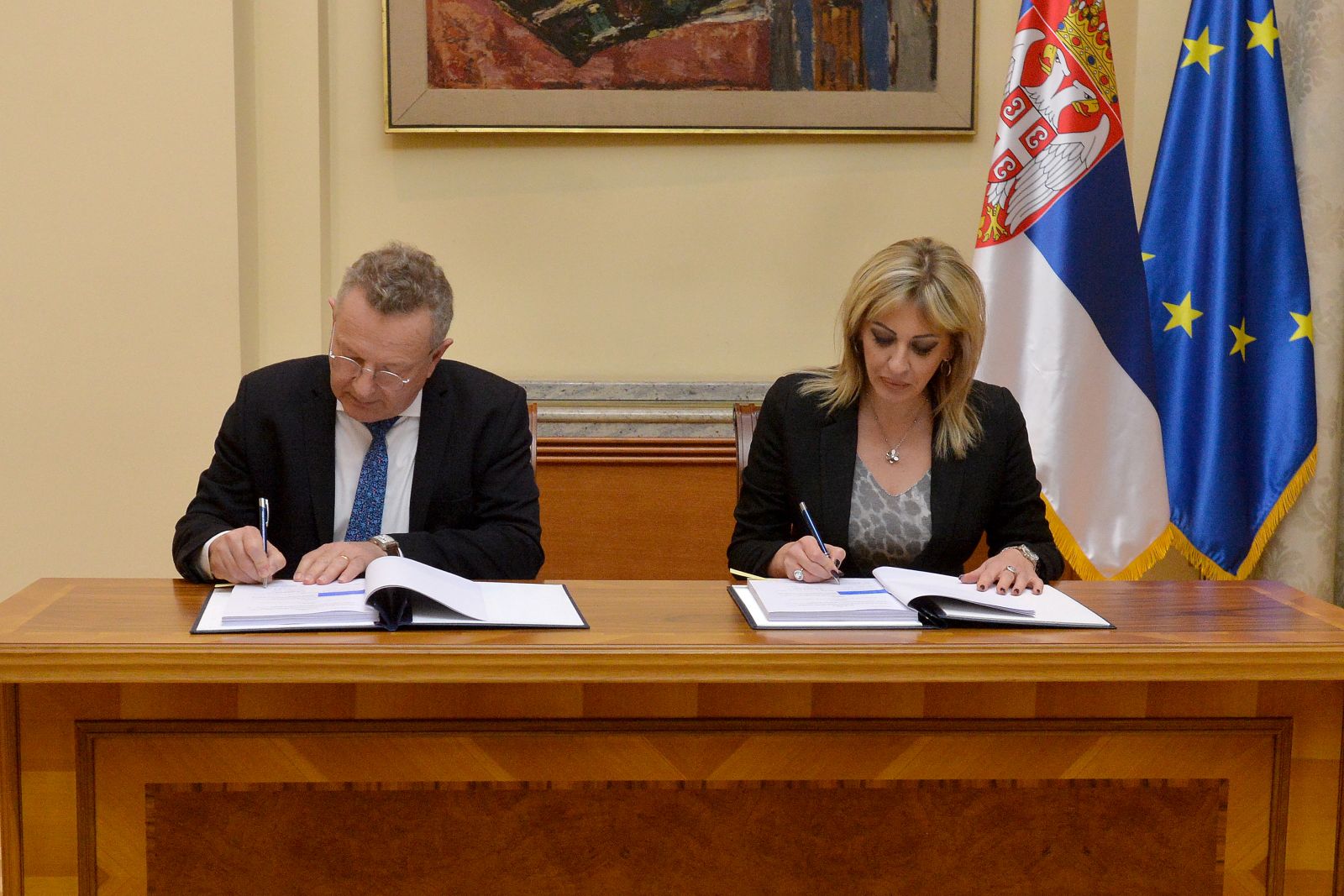
Minister of European Integration Jadranka Joksimović has signed a new contract today with Deputy Director General of the Council of Europe Development Bank Stephan Sellen on the Ninth sub-project of the regional care programme for refugees and internally displaced persons worth EUR 23.5 million that envisages housing solutions for another 900 refugee families.
After signing the contract, Joksimović has recalled that the Programme was launched in 2014 and that 16,780 refugees and displaced persons have been identified in Serbia who should be provided with permanent housing.
She has highlighted that from the beginning, eight donation contracts have been signed in the total value of EUR 126,457,000, of which EUR 105,156,000 are direct donations, namely, grants from the Regional Housing Fund.
Minister Joksimović, who was the signatory of all of the previous agreements, has explained that, in addition to the aforementioned contract, an agreement on providing support to the operational structure has been signed worth EUR 4.2 million.
“Five years have passed since the signing of the first agreements that have envisaged the collective construction of 2,451 housing units, 311 prefabricated houses, allocation of 1,989 building materials packages, and purchase of 1,565 farmhouses and 130 apartments”, she indicated.
Joksimović has pointed out that each of these forms of housing care is being implemented in more than 120 municipalities throughout Serbia.
The Ninth sub-project, valued at EUR 23.5 million and aimed at allocating 900 new housing units, was approved at the Donors' Assembly held in June and signed today for the purpose of providing care of a further 900 families.
Joksimović has also emphasised the significance of the Regional Care Programme for Serbia and those individuals who have been disadvantaged in the elementary sense for decades and are in need of housing.
She has recalled that the Programme also includes refugees in other countries of former Yugoslavia, and that Serbia has identified 16,780 refugees and displaced persons who are in need of a permanent housing solution.
She has added that there is never enough money for housing care, not only in Serbia, but also in the wider region, which is why donations are crucial from a human, but also economic aspect, as they provide permanent care to all of the families.
Furthermore, the Minister has conveyed that she has also signed an amendment to the existing agreement today, enabling the expansion of the list of beneficiaries involved in the project that is currently being implemented, and ensuring, for this purpose, additional EUR 5.1 million, which means the provision of another 250 additional housing units and rural houses.
“As the government, we continuously cooperate with the Council of Europe Development Bank and other bilateral donors in implementing this programme. The largest amount of funds has been provided by the EU from pre-accession funds, while a large number of other donors speaks about the significance and size of the programme. In addition to the EU, the USA, Switzerland, Germany, Italy, Norway, Turkey, Luxembourg, Denmark, the Czech Republic, Slovakia, Hungary, Romania, Spain and Cyprus have joined the programme”, explained Joksimović.
The Minister has added that through joint action and financing, the Government of the Republic of Serbia has provided the remaining funds in terms of co-financing with the aim of resolving the still ongoing problem of providing care to refugees and displaced persons.
“I believe that through this project, which is being implemented both with the UNHCR and OSCE, we will be able to resolve people’s existential and development issues. When people solve their housing issues, they can devote themselves to every other type of development and become a progressive part of the economy and society overall”, she explained.
The Head of the Council of Europe Development Bank has indicated that the funds for this programme come from donors, the predominant one being the EU.
He has said that he is very pleased to convey that Germany has recently approved additional funds, adding that he heard yesterday that Switzerland was planning to provide further funds as well.
“This shows that donors have confidence in the proper implementation of the Programme”, he concluded.
Sellen has stated that Spain is a new donor that decided to take such a step due to the fact that this project involves reconciliation and has so far made positive effects on people.
He has also said that the Programme has had significant impact on the economy, as more than EUR 100 million in investments has contributed to the employment of several thousand people during project implementation.
It is a significant stimulus to the economy and contributes to reconciliation in the region, emphasised Sellen.
Source: Tanjug














